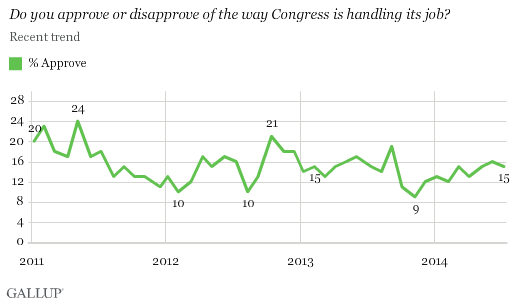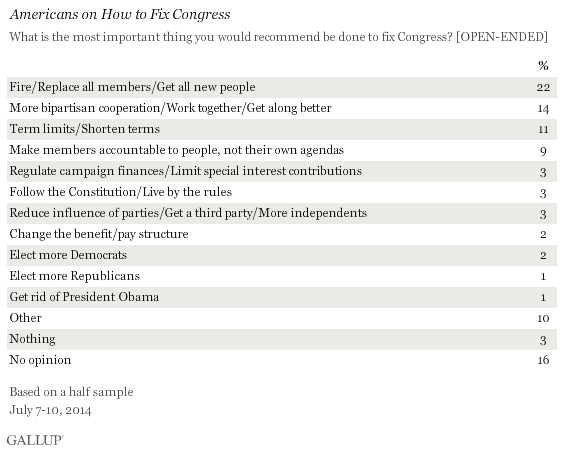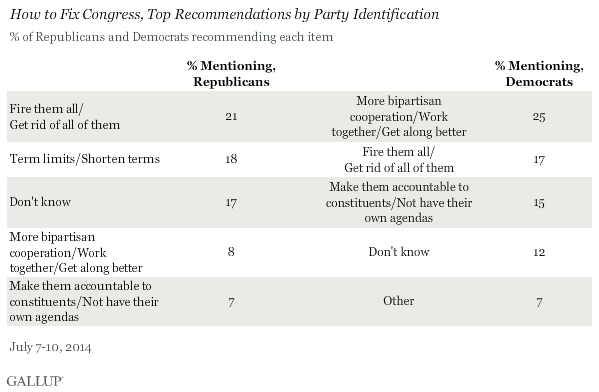WASHINGTON, D.C. -- Fifteen percent of Americans approve of the way Congress is handling its job. Congressional ratings show little sign of substantial recovery from last year's record low as November's midterm elections draw closer.

These findings come from a July 7-10 Gallup poll, with this most recent reading virtually unchanged from June's 16% approval. The stability in this metric -- it has not fluctuated much over the course of this year -- suggests that the 435 House members and one-third of the Senate who face re-election could do so amid the lowest congressional approval ratings for a midterm election in modern political history. Gallup historically has found that low congressional approval ratings are associated with higher congressional turnover.
The current divided control of Congress complicates the picture, however. In one sense, divided control has contributed to Congress's sickly approval ratings, as it denies the Hill the usual reservoir of partisan support that traditionally comes with one-party control. Republicans and Democrats approve of Congress at similarly (low) levels -- 17% and 16%, respectively. Congress is, as Gallup Senior Editor Jeff Jones put it, a "political orphan" that neither Republicans nor Democrats will adopt as their own.
The divided control of Congress combined with Americans' bipartisan disapproval portend an electoral outcome that may not be as straightforward as was true in previous midterms when the party in control of both houses was electorally routed, as in 1994, 2006, and 2010. The historical record offers few data points to consult on this matter. In post-World War II politics, there have been three midterm elections featuring a divided Congress: 1982, 1986, and 2002. In two of these instances, the party controlling the House won the keys to the Senate, but in 1986 this was a blow to the sitting president, and in 2002 it was a boon. In 1982, there was no change in party control of Congress after the elections. The 1986 example is probably the most germane to today's situation: It saw a sixth-year president (Ronald Reagan) trying to keep his party in power in the Senate, to no avail.
Public Ready to Start Over to Fix Congress
Congress's low approval ratings for the past several years underscore the idea that Americans think their representative bodies need dramatic changes. Gallup in the current poll asked respondents in an open-ended format what their most important recommendation to fix Congress would be. More than one in five Americans (22%) are ready to start over entirely, saying all members should be fired or replaced. Clearly, there won't be a wholesale turnover in congressional representation in any election, but the general idea of replacing the old with the new does speak to the public's immense frustration with the legislative branch.
One in seven (14%) say bipartisan cooperation is the ticket to fixing Congress. About one in 10 (9%) want to "make members accountable to people, not their own agendas," an umbrella category that includes specific reforms such as limiting the number of recesses Congress takes, ending gerrymandering, or requiring balanced budgets. Another 11% favor enacting term limits or shorter terms, an action Congress could take if it were willing. A bill has been introduced this legislative session that would amend the Constitution to impose on legislators a 12-year limit for serving in the House and an additional 12 years for the Senate. Gallup found several other items receiving smaller levels of support, including "regulate campaign finance laws" (3%), "elect more Democrats" (2%), and "get rid of President Obama" (1%).

Still, for some Americans, the remedy is elusive -- 16% have no opinion on how to fix Congress, and another 3% say "nothing."
Americans who say they affiliate with one of the two major political parties have somewhat differing perspectives on the best recourse to rehabilitating Congress. A plurality of Republicans (21%) want to fire all members, and another 18% would impose term limits and/or shorten terms. Fewer than one in 10 Republicans (8%) suggest bipartisan cooperation.

The highest percentage of Democrats, on the other hand, advocates bipartisan cooperation (25%) as the remedy for Congress's ills. Seventeen percent want to fire or replace all members; 15% believe it is important to make members more accountable to people, instead of having their own agendas.
Bottom Line
With less than four months remaining before the 2014 midterms, the parties in control of each chamber are pushing through legislative priorities their base supports. These include the House Republican leadership's announcement that it will pursue a bill that would initiate a lawsuit against President Barack Obama. Meanwhile, Senate Majority Leader Harry Reid has said he would like to see his chamber pass legislation that reverses the Supreme Court's recent decision allowing "closely held" corporations to refuse to provide some types of contraceptive coverage to their employees, an action that could boost Democratic enthusiasm for the coming elections.
But while these moves may fire up partisans, only 15% of Americans overall approve of the job Congress is doing, including about equal shares of Democrats and Republicans. That so many advocate voting into office a completely new Congress is perhaps a sign of anti-incumbency fervor. Others want to see bipartisan cooperation take over the Hill, an unlikely event as election-year agendas become front and center. This mixture of disapproval and disappointment that so many Americans feel toward Congress could produce unpredictable results this fall.
Survey Methods
Results for this Gallup poll are based on telephone interviews conducted July 7-10, 2014, on the Gallup Daily tracking survey, with a random sample of 1,013 adults, aged 18 and older, living in all 50 U.S. states and the District of Columbia.
For results based on the total sample of national adults, the margin of sampling error is ±4 percentage points at the 95% confidence level.
For results based on the sample of 494 national adults in Form A, the margin of sampling error is ±6 percentage points.
Interviews are conducted with respondents on landline telephones and cellular phones, with interviews conducted in Spanish for respondents who are primarily Spanish-speaking. Each sample of national adults includes a minimum quota of 50% cellphone respondents and 50% landline respondents, with additional minimum quotas by time zone within region. Landline and cellular telephone numbers are selected using random-digit-dial methods. Landline respondents are chosen at random within each household on the basis of which member had the most recent birthday.
Samples are weighted to correct for unequal selection probability, nonresponse, and double coverage of landline and cell users in the two sampling frames. They are also weighted to match the national demographics of gender, age, race, Hispanic ethnicity, education, region, population density, and phone status (cellphone only/landline only/both, and cellphone mostly). Demographic weighting targets are based on the most recent Current Population Survey figures for the aged 18 and older U.S. population. Phone status targets are based on the most recent National Health Interview Survey. Population density targets are based on the most recent U.S. census. All reported margins of sampling error include the computed design effects for weighting.
In addition to sampling error, question wording and practical difficulties in conducting surveys can introduce error or bias into the findings of public opinion polls.
View survey methodology, complete question responses, and trends.
For more details on Gallup's polling methodology, visit www.gallup.com.
